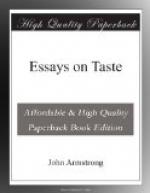True genius may be said to consist of a perfect polish of soul, which receives and reflects the images that fall upon it, without warping or distortion. And this fine polish of soul is, I believe, constantly attended with what philosophers call the moral truth.
There are minds which receive objects truly, and feel the impressions they ought naturally to make, in a very lively manner, but want the faculty of reflecting them; as there are people who, I suppose, feel all the charms of poetry without being poets themselves.
OF TASTE.
Our notion of taste may be easily understood by what has been said upon the subject of genius; for mere good taste is nothing else but genius without the power of execution.
It must be born; and is to be improved chiefly by being accustomed, and the earlier the better, to the most exquisite objects of taste in its various kinds. For the taste in writing and painting, and in every thing else, is insensibly formed upon what we are accustomed to; as well as taste in eating and drinking. One who from his youth has been used to drink nothing but heavy dismal port, will not immediately acquire a relish for claret or burgundy.
In the most stupid ages there is more good taste than one would at first sight imagine. Even the present, abuse it with what contemptuous epithets you please, cannot be totally void of it. As long as there are noble humane and generous dispositions amongst mankind, there must be good taste. For in general, I do not say always, the taste will be in proportion to those moral qualities and that sensibility of mind from which they take their rise. And while many, amongst the great and the learned, are allowed to have taste for no better reason than that it is their own opinion, it is often possessed by those who are not conscious of it, and dream as little of pretending to it as to a star and garter. An honest farmer, or shepherd, who is acquainted with no language but what is spoken in his own county, may have a much truer relish of the English writers than the most dogmatical pedant that ever erected himself into a commentator, and from his Gothic chair, with an ill-bred arrogance, dictated false criticism to the gaping multitude.
But even those who are endued with good natural taste, often judge implicitly and by rote, without ever consulting their own taste. Instances of this passive indolence, or rather this unconsciousness of one’s own faculties, appear every day; not only in the fine arts, but in cases where the mere taste, according to the original meaning of the word, is alone concerned. For I am positive there are many thousands who, if they were to bring their own palate to a severe examination, would discover that they really find a more delicious flavour in mutton than in venison, in flounder than in turbut, and yet prefer middling or bad venison to the best mutton; that is, what is scarcest and dearest, and consequently what is, from the folly of mankind, the most in vogue, to what is really the most agreeable to their own private taste.




